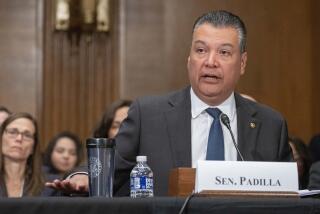Democrats’ Tax Cut Plan Opposed by Some in Party : Congress: The disagreement could mean major changes, or even defeat, when the measure is sent to the full House.
WASHINGTON — The newly crafted Democratic tax cut package ran into unexpected opposition from House Democrats on Tuesday, raising the possibility that it may face major changes--or even defeat--when the bill comes before the full House.
Although House leaders are not considered likely to scuttle the bill, strategists concede that it is facing widening dissatisfaction that is expected to surface today at a meeting of the House Democratic Caucus.
It was not immediately clear how many Democrats ultimately might oppose the bill when the caucus meets. But some have estimated that as many as 50 or 60 could press for change--enough to threaten the prospects for passage if the measure was sent to the floor.
Democratic leaders have been scheduled to bring the tax bill before the full House on Feb. 25 and 26 as a substitute for the President’s original tax cut plan and a much smaller “streamlined” version of Bush’s proposal that has been put together by House Republicans.
Lawmakers said Tuesday that House leaders had been considering rushing the tax bill to the floor Thursday if the reception in the caucus today was enthusiastic. That now seems unlikely, they said.
The developments came as President Bush, seeking to capitalize on the Democrats’ apparent disarray, summoned Republican lawmakers to the White House to urge them anew to take the offensive against the Democratic bill.
Just before the hourlong session Bush told reporters, “We’ve got a good plan” that ought to be enacted. And White House Press Secretary Marlin Fitzwater said later that prospects that Bush will veto the Democratic plan “are pretty strong, I would say.”
Fitzwater also hinted that Bush would be willing to reinstate his proposal for a $500-per-child increase in the personal exemption if it would help speed enactment of the smaller, “streamlined” GOP package as an emergency stimulus for the economy.
The President’s original tax package, unveiled during his State of the Union message Jan. 28, had included the $500-per-child increase, but the proposal was jettisoned from a version put together by House Republicans, which Bush later endorsed.
Fitzwater said Tuesday that the President would relent on the issue, even after arguing earlier that enacting the provision now could increase the budget deficit.
Bush has come under fire in recent days from rival GOP presidential candidate Patrick J. Buchanan for failing to include the tax credit in the streamlined version of the package. Buchanan claimed that Bush was abandoning the middle class by excluding it.
The growing opposition among Democrats to the newly crafted Democratic alternative was said to stem from several factors.
Some Democrats believe that the proposal, assembled last week by Democrats on the House Ways and Means Committee, contains too big a cut in capital gains taxes and is not targeted enough toward the poor.
Others oppose the 1% cut that the plan would make in corporate income-tax rates, and still others--including some liberal and middle-of-the-road lawmakers--are skeptical about whether enacting a tax reduction now would help or hurt the economy.
“I never thought we ought to have a tax cut at all,” Rep. Don J. Pease (D-Ohio), reiterated Tuesday. Rep. Robert T. Matsui (D-Sacramento), agreed. “We might have been better off without one,” he said.
The opposition showed up informally Tuesday at a caucus of Democrats on the House Budget Committee. Members were visibly skeptical of the measure, and other Democrats said they felt the same way.
Two weeks ago, at a meeting of the full House Democratic Caucus, House Democratic leaders were stunned when many members of the group expressed opposition to a tax cut of any kind.
On Monday, the AFL-CIO executive council expressed opposition to the tax cut bill, warning that a tax cut, even for the middle class, was unlikely to help the economy. The group urged Congress to move instead to boost spending on public works and education.
Budget Director Richard G. Darman signaled Tuesday that the Administration would consider using savings from defense cuts to boost domestic programs if Congress agreed to limit outlays for mandatory benefit programs such as Medicare, Medicaid and food stamps.
Darman previously has said only that the Administration might be willing to apply such defense cuts to help finance Bush’s proposed increase in the personal exemption. But his testimony Tuesday, delivered before the Senate Appropriations Committee, went beyond that.
Darman noted Tuesday that, unless Congress limits outlays for these fast-growing entitlement programs, the squeeze on other domestic spending “is going to get worse.”
He suggested that imposing a ceiling on outlays for most entitlement programs would be important enough to justify revising the 1990 budget accord between Congress and the White House.
Times staff writer William J. Eaton contributed to this story.
More to Read
Get the L.A. Times Politics newsletter
Deeply reported insights into legislation, politics and policy from Sacramento, Washington and beyond. In your inbox three times per week.
You may occasionally receive promotional content from the Los Angeles Times.










